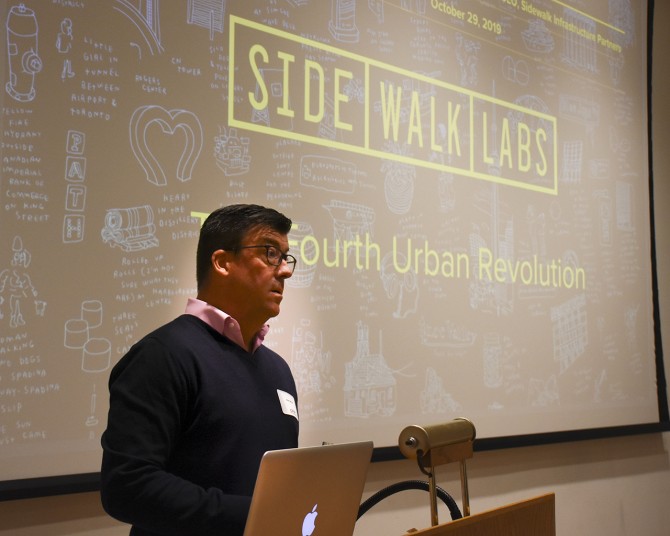Panelists discuss infrastructure and technology
By Stephen D'Angelo
“We’re trying to take a multidisciplinary approach, which I think Cornell is particularly adept at, to solve a set of social problems around infrastructure,” said Richard Geddes, professor of policy analysis and management, at the “Infrastructure and Technology” event, held Oct. 29 in the Herbert F. Johnson Museum of Art.
The event was hosted by the Cornell Program in Infrastructure Policy (CPIP).
“Physical infrastructure is great,” Geddes said, “but we should also focus on the services that are provided by that infrastructure and the economist who sees the underlying value of those services – clean water, energy, heat, lights, transportation, communication services, health care services – that are provided by this fundamental infrastructure.”
Based in the College of Human Ecology, CPIP focuses on using collaborations across campus to improve the delivery, maintenance and operation of physical infrastructure through teaching, research and policy outreach. In partnership with Cornell Engineering and Cornell Tech, the program coordinates with scholars and industry experts across multiple disciplines who share an interest in public policies impacting infrastructure.
Panel speakers were industry specialists in areas including digital infrastructure for the skies, opportunities for infrastructure through robotics, geothermal scalabilities and the digital transformation of cities.
Brian B. Barlow, director of infrastructure for Sidewalk Labs and a member of CPIP’s advisory board, discussed the need for innovation in infrastructure in future developments and his current projects, which envision tomorrow’s infrastructure for cities.
“We set out originally as a thought experiment and asked ourselves, if we were to reimagine how to build a city, how would we do it differently, and it really caused us to rethink why we are where we are,” he said. “To do this, we looked back to the fundamental technology innovations that shaped cities and the impact they had on our physical infrastructure and the way that we organize within a human ecology and sociological perspective.”
Barlow said the steam engine shrank distance, the electric grid allowed development of the elevator and the capacity to build vertically, and private automobiles shaped cities through vast roads and parking infrastructure.
According to Barlow, the confluence of some key innovations – ubiquitous connectivity, artificial intelligence, low-cost sensors, cameras and robotics and automation – are all leading to what he called the fourth urban revolution: the digitization of built environments and the impact that has on cities, enabling a completely new way to design and organize metropolises that can dramatically improve the quality of life.
“We started really looking at some emerging technologies and what they mean to the urban environment,” he said. “We now have technologies, especially with the advent of ubiquitous access to information and data through 5G [networks], that will begin to converge the digital divide and fundamentally reshape the way cities organize themselves.”
Barlow concluded, “[M]achine learning and AI applied toward industrial automation has really started to change the profit structure of infrastructure.”
This is something for which Thomas O’Rourke, Cornell’s Thomas R. Briggs Professor of Engineering and a member of the program’s advisory board, believes CPIP can generate solutions.
“Cornell is in the business of minds, and these are the minds that we are trying to educate to create ideas that transform the way we do things,” O’Rourke said. “I think there are challenges, and I hope we all put our heads together to try and bring solutions to some of these problems as we work with this wonderful program. It takes technology to provide the tools, but it takes a village to solve the problem – and I think CPIP is the convener for that challenge.”
Stephen D’Angelo is assistant director of communications in the College of Human Ecology.
Media Contact
Get Cornell news delivered right to your inbox.
Subscribe

